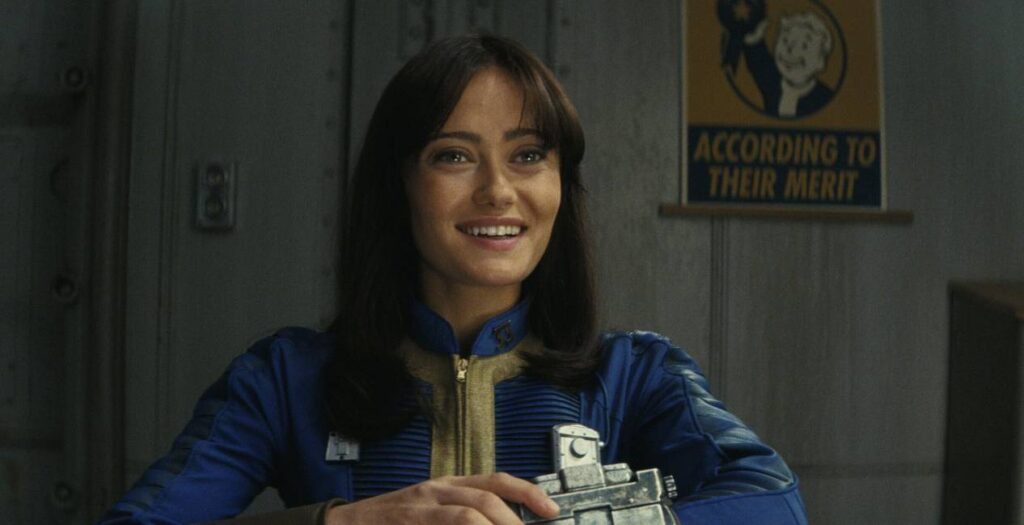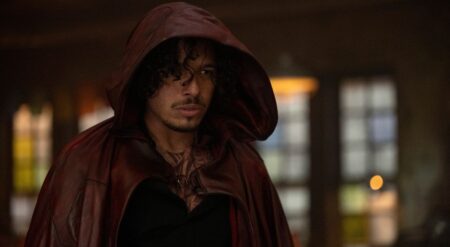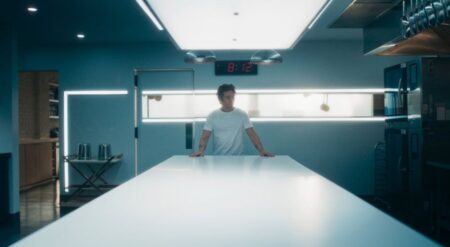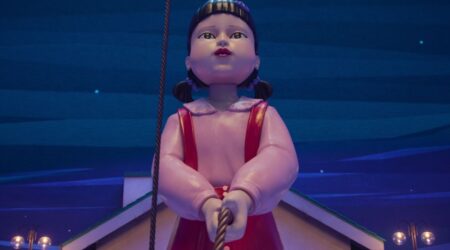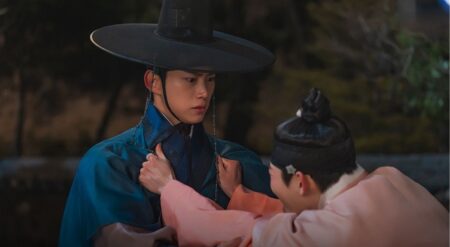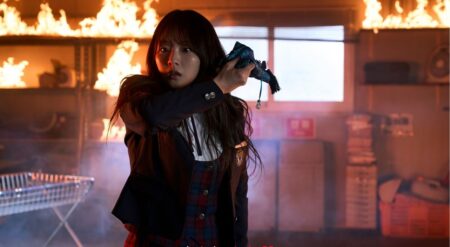I love Fallout as an IP. It’s a rich world that bridges humor and the grime of humanity to make something unique. But even without that deep-running love of the video games, I can stand back and look at Amazon Studios‘ take on the world and see it stand on its own. In reality, the Fallout TV series is the best live-action adaptation of a video game out there.
Based on one of the greatest video game series of all time, Fallout is a story of haves and have-nots in a world with almost nothing left to have at its core. Set two hundred years after the apocalypse, this Amazon Studios series and Prime Video Original embraces the gleefully weird and highly violent universe of the video games and never pulls its punches when doing so. The series comes from Kilter Films and executive producers Jonathan Nolan and Lisa Joy, with Nolan directing the first three episodes. Geneva Robertson-Dworet and Graham Wagner serve as executive producers, writers, and co-showrunners, bringing Bethesda‘s world to life.
The heart of the series is Ella Purnell as Lucy. With an “Okie Dokie” and an optimistic view of the world’s future, she is a resident of Vault 33. Ready to get married, have a kid, and prep Vault 33 under her father, the Overseer, to return to the surface, Lucy is the best there is in the Vault. She’s the best at shooting, combat, and actual studies, too. But when her father (Kyle MacLachlan) is kidnapped, her idealistic nature is tested when she heads to the surface to save him.
On the surface, irradiated by nuclear war, Lucy meets Maximus (Aaron Moten). Orphaned by the war that never changes, he is a young soldier who rises to the rank of squire in the Brotherhood of Steel. Having dedicated himself to the Brotherhood to get revenge on the people who cost him everything, he puts them first. With Power Armor at his side, he’s set to follow orders, for at least the beginning of the season.
And then, finally, there is the Ghoul, played by Walton Goggins. A morally ambiguous bounty hunter who holds within him a 200-year history of the post-nuclear world, he is our narrator in a way. His life sets the series in perspective and his moral compass directs the narrative where it needs to go. The three of them collide, all chasing an enigmatic researcher and his pup, CX404, who have the potential to change the power dynamics of the Wasteland.
The post-apocalyptic nature of Fallout is important, but the humor is what sets this franchise and series apart from the pack. The tonal disconnect from the atomic age retrofuturism of the American Dream-obsessed Vault-dwellers against the irradiated survivors of the Wasteland is unique. The prim and proper against the vile and feral, it’s a blend that immediately works to bring out the humor of any situation. With characters that are just as absurd as their surroundings, everything sings.

A Matt Berry voiced Mr. Handy is just as funny and literal as the games. Jon Daly, a Wasteland “doctor,” names norm-slinging tonics that definitely do more harm than good. Dale Dickey is Ma June; she runs a store and does more than her fair share of work under the table. Dave Register is a clueless Vault-dweller in love with his childhood sweetheart. Annabel O’Hagan is a pregnant woman with an eyepatch ready to raise a kid in Vault 33. Leslie Uggams is an Overseer with way too many secrets. And then there is Norm (Moisés Arias), a kid brother with no real purpose. Zach Cherry is just trying to make 33 a better place. And then there is the intimidating Sarita Choudhury as Moldaver.
No matter where you look, the wide extended cast embodies the weirdness of their world, and they never lose sight of the chaos and mayhem that Wasteland entails. At the same time, militaristic organizations aim to grasp some semblance of power.
But humor doesn’t detract from the series’s violence. From severed limbs to abominations with fingers of teeth and a lot of bullets, the series doesn’t pretend to be something that it isn’t. It’s violent, eccentric, and just the right amount of gross to make it all come together in one messed-up package. Between The Boys and Invincible, Prime Video has become a home for stylized ultraviolence, but Fallout still remains unique.
Truth be told, the Fallout TV series succeeds in the same way that animated series like Castlevania and Arcane did. Its source material doesn’t hold it back. Instead, it’s emboldened by it. Fallout is just a damn good sci-fi series, regardless of the lore that already exists. The series can stand on its own as a brilliant take on the inequities of survival, the constant evils of capitalism, and why you should always have a good dog by your side.
However, when you look at this live-action series in conversation with the existing video games, it excels even further. With smart moments of fanservice, like CX404, showing the VAT system without showing the VAT system, and the ridiculous radroaches, it’s clear that the series was made with love. Add in the fantastic song placement of some Fallout favorites and using the radio to tie it all together, it doesn’t get better than this. As a franchise, this one thrives on telling new stories. With each subsequent game, we learn more about the world and build it larger by exploring Vault-tec’s tendrils and the Wasteland. In this spirit, Fallout provides an invaluable experience to new audiences who have never picked up a video game.
Robust in its detailed storytelling and grounded in its stance against companies ever choosing to do what’s right, Fallout is going to be the defining moment for many new fans of the franchise and a coming back home to those who have been wanting a new experience in the Wasteland since Fallout 76’s release in 2018. It’s a difficult journey to honor what exists while crafting your identity, but the showrunners have done it with the Fallout TV series.

They’ve created a television show that uses existing lore and expands it. It reaches into the past and before the first bomb drops. It puts Fallout 2 into conversation with New Vegas and others in the franchise. It connects everything that came before it but offers character stories that dig deeper into the world. Chief among them are Lucy and the Ghoul.
Through Lucy, we learn extensively how the Vaults work, as well as the Wasteland itself. She’s the audience stand-in in the best way. We see her growth from saying a naive “okie dokie” initially to saying the same humorous line under new circumstances and with a different weight. While the story takes on the traditional Fallout storytelling—you always have to find a dad—seeing the world through Lucy’s eyes makes the series extremely accessible to anyone new to the franchise.
She’s competent and caring and becomes a badass you can root for. The fact that she’s dedicated to her optimism, even in the darkest of times, feels good. She is changed by Episode 8, but her joy and hope remain even with all of the trauma she’s endured and uncovered along the way.
At the same time, Goggins’s Ghoul (né Cooper Howard) expands the franchise’s lore and does so in the only way that the iconic character actor knows how to: fantastically. He can be morally ambiguous at points, but the Ghoul is unrelenting in his personal motives. He knows what is right and wrong, and when that shifts in the Wasteland, you understand why. At the same time, he works as a bridge to connect us to the past before the bombs drop.
He expands the Vault-Tec lore by showing the audience the obvious ends of evil capitalism but does it in a personal way. We see his family and how it impacts how he relates to his place as a Vault-Tec spokesperson. From there, we see Cooper become the base for Vault Boy.
If there is any critique of the series, it’s that the third character in its ensemble. While Aaron Moten’s Maximus isn’t bad by any stretch, he is underdeveloped. Where Lucy and the Ghoul get extensive backstories with lore-influencing experiences, Maximus and his experiences in the Brotherhood of Steel only begin to scratch the surface of the faction.

As a character, Maximus is an entry point into the fascist religious zealotry of the Brotherhood, but that’s where it stops. There is more to his life, both before and after the second bombs. But we don’t see it. Even just a 10-episode series could have delivered what was needed. Still, he has the most room to expand in the inevitable Fallout Season 2.
Even with that small stumble, the fact that the Wasteland and the Vaults are all their own characters more than make up for it. The world of Fallout Season 1 is something you can walk into. The reliance on practical effects and the stunning production design make every set feel like something more.
Much like a video game, Fallout’s environmental storytelling does a lot of heavy lifting to show how deep the series goes into honoring the storied franchise. Whether it’s messages on a radio, flyers in the background, or choices in the signs and building names, everything offers a little bit more of the world. Like any good level in a video game, each set tells the audience the tone, the reason for being there, and the larger narrative.
This all ultimately makes Fallout the finest live-action adaptation of video game source material. It’s strong, it’s goddamn hilarious, and it highlights exactly how to swing for the fences while still knowing where Homebase is. It may be a new series, but Fallout is an instant classic of the streaming age. A second season just can’t come soon enough. Ending this review at around 1700 words, and even with that, there is so much more I didn’t talk about. From hidden Vault Boys and large impacts on game lore going forward, you’ll just have to watch to see how expansive this series is and why it sets a new standard for video game TV.
Fallout is streaming Wednesday, April 10, 2024 at 6pm PT.
Fallout is New Standard for Video Game TV | Review
Amazon Studios’ Fallout brings audiences to Vault 33, the Wasteland, and builds the lore larger than we’ve seen before. We review Fallout Season 1. Read our 9.5/10 full review here: https://butwhytho.net/2024/04/fallout-tv-show-review-amazon-studios/
Fallout Season 1
-
Rating - 9.5/109.5/10
TL;DR
It’s strong, it’s goddamn hilarious, and it highlights exactly how to swing for the fences while still knowing where Homebase is. It may be a new series, but Fallout is an instant classic of the streaming age.

